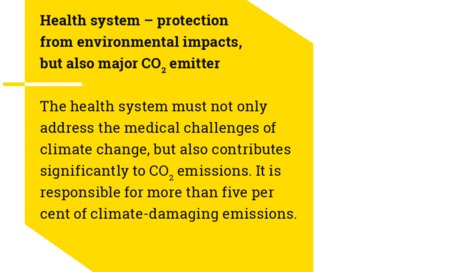 iStock / guruXOOX
iStock / guruXOOX
Climate change – new challenges for the social insurance system
Climate change affects society in many ways and poses major challenges for occupational health and safety as well as healthcare. The effects of climate change are already noticeable today and manifest themselves in severe weather events such as storms, floods and heat waves, in an increasing prevalence of allergies and the spread of infectious diseases, some of which are new.
ed* Nr. 01/2023 – Chapter 3
Climate change and environmental pollution thus have a direct impact on both individual and collective health. There are risks to occupational safety and health, especially in outdoor activities, for example in construction and agriculture.
In addition, jobs in the climate-neutral economy place new demands on occupational health and safety.
For example, hydrogen plays a special role in the reduction of carbon dioxide emissions for the success of the energy transition. However, the use of this chemical element is not without danger and brings new challenges for occupational safety and health. Due to the necessary building renovations, the health hazards posed by asbestos are also becoming a current topic. Since there is a long period of time between the exposure of workers and the occurrence of health consequences, such as lung cancer, it is not possible to wait until there is an increase in disease indications. Instead, quick action is required.
Events that take place outside the EU, such as an expansion of steppes and deserts due to prolonged droughts, can also have an indirect impact on European society, for example by triggering strong immigration or supply chain disruptions. Events triggered by climate change can thus have an impact on both pay-as-you-go and fully funded systems.
Studies also show that poorer people often live and work in a more polluted environment. This often results in considerable social and health-related consequential costs.
Reducing the medium and long-term impacts of climate change therefore contributes not only to a fair and prosperous society with a modern and competitive economy, but also to a long-term relief of the social insurance systems.1
Social insurance in Germany will face up to its responsibility and systematically reduce the CO2 footprint in administration and service provision along clearly formulated goals towards climate neutrality. Last not least, product standards and the consideration of environmental criteria within the framework of joint procurement could also make a significant contribution. Pharmaceutical products, for example, account for 20 per cent of emissions in the healthcare sector. Common standards – also in occupational safety and health – must be adapted or newly developed. Joint action at EU level is required here, which must not be limited to research and the exchange of best practice examples.
Initiatives have already been launched at European level. The Chemicals Strategy aims to promote safer, sustainable chemicals more strongly on the one hand, and to better protect people and the environment from hazardous substances on the other. Various regulations are addressed here, including the revision of the Regulation on Registration, Evaluation, Authorisation and Restriction of Chemicals (REACH).2 But the EU has also been monitoring the exposure of workers to asbestos and proposed a revision of the European rules to adjust the current limits as early as last year.


